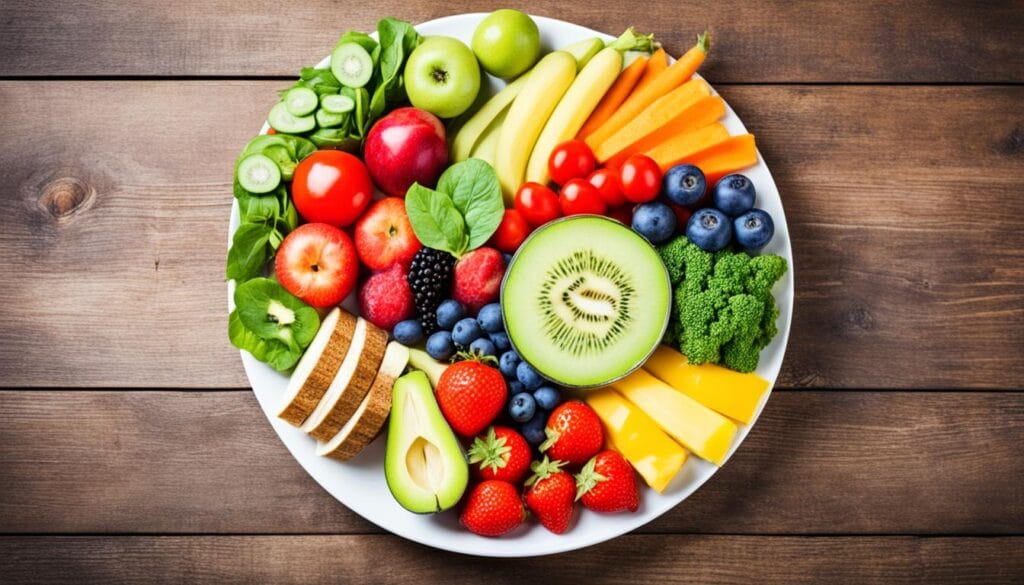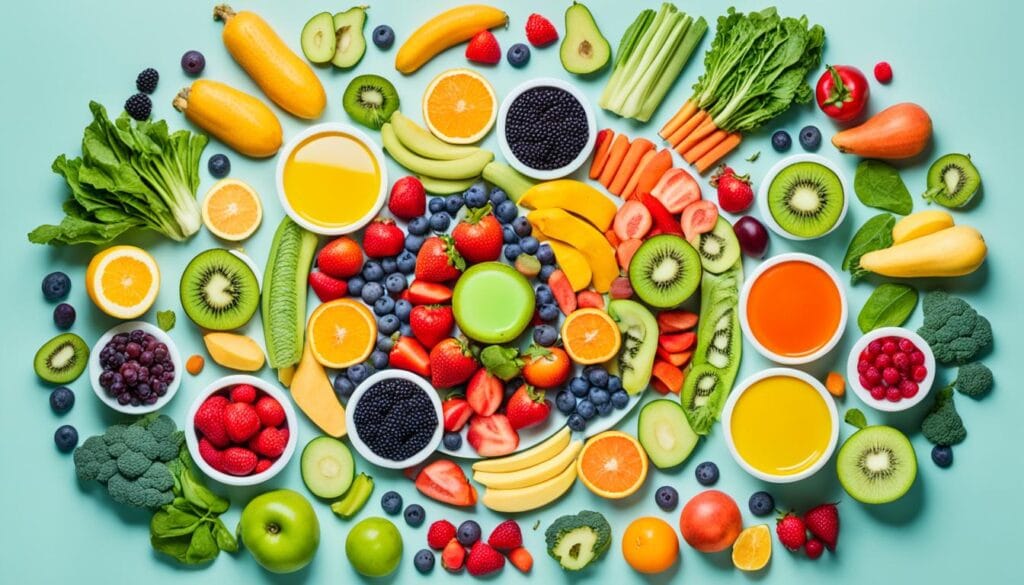
For new moms, eating well is key to getting better, helping with milk production, and feeling good. This guide will show how to make a diet plan that’s full of nutrients. It covers important topics like calories, nutrients like iodine and choline, and how to keep up milk supply and balance hormones. You’ll also get a 5-day meal plan with tasty recipes and tips for cooking.
Key Takeaways
- Nourish the body with a balanced postpartum meal plan to support recovery, promote milk production, and maintain overall wellbeing.
- Include a variety of nutrient-dense foods from all food groups to meet calorie and macronutrient needs.
- Address considerations around weight loss, key nutrients, and balancing the diet with milk supply and hormone regulation.
- Incorporate a sample 5-day meal plan with nutritious recipes and meal preparation tips.
- Prioritize whole, minimally processed foods to optimize nutrient intake and overall health.
Importance of Postpartum Nutrition
Eating a balanced diet after having a baby is key for postpartum recovery, nutrient replenishment, and postpartum wellness. A good postpartum nutrition plan helps the body heal faster, boosts bone health and iron stores, and supports breastfeeding nutrition and milk supply.
Speeding Recovery and Replenishing Nutrient Stores
Pregnancy and childbirth use up the body’s nutrient-rich stores. Eating a nutrient-dense diet full of whole foods helps refill these important nutrients. It supports the body’s postpartum recovery. Eating a variety of nutrient-rich foods helps with bone health and iron stores, which get low during this time.
Promoting Milk Production for Breastfeeding
For moms who breastfeed, a balanced postpartum nutrition plan is key for a healthy milk supply and lactation. Foods high in protein, healthy fats, and carbs are important for breastfeeding nutrition. Eating a mix of nutrient-rich foods makes sure the breast milk is good for the baby’s growth and health.
Supporting Overall Wellbeing and Stamina
A balanced postpartum diet does more than help with recovery and breastfeeding. It also keeps a new mom’s energy and postpartum wellness up. Choosing nutrient-dense, whole foods gives the body and mind the calories, nutrients, and vitamins needed during this tough time.
Postpartum Diet Guidelines
After having a baby, eating a balanced and nutrient-rich postpartum diet is key. Eating a variety of healthy foods from all food groups helps new moms meet their nutritional needs.
Choosing a Variety of Foods from All Food Groups
Your diet after having a baby should have lean proteins, fresh fruits and vegetables, whole grains, and healthy fats. These foods are packed with vitamins, minerals, and nutrients your body needs to heal.
- Lean proteins: Chicken, turkey, fish, eggs, legumes
- Fruits and vegetables: Berries, leafy greens, sweet potatoes, broccoli
- Whole grains: Quinoa, brown rice, whole wheat bread
- Healthy fats: Avocado, nuts, seeds, olive oil
Staying Hydrated Throughout the Day
Drinking enough water is vital for recovery and breastfeeding. Experts say breastfeeding mothers need up to 3 liters of water daily. Drinking water and eating water-rich foods helps with health and milk production.
“Adequate hydration is essential for postpartum recovery and maintaining a healthy milk supply.”
Calorie and Macronutrient Needs
After having a baby, eating right is key for your recovery and health. It’s important to know how many calories and what nutrients you need, especially if you’re breastfeeding. Let’s look at the calorie and nutrient balance for breastfeeding and non-breastfeeding moms.
Recommended Calorie Intake for Breastfeeding and Non-Breastfeeding
Breastfeeding moms need more calories to make milk. They should aim for 2,300 to 2,500 calories a day. Non-breastfeeding moms need about 1,800 to 2,000 calories during the postpartum period.
| Condition | Recommended Calorie Intake (per day) |
|---|---|
| Breastfeeding | 2,300 to 2,500 calories |
| Non-Breastfeeding | 1,800 to 2,000 calories |
It’s crucial to eat the right amount of postpartum calorie needs. Also, balance your macronutrient balance to meet your body’s needs during this time.
Focus on your breastfeeding calorie needs and a balanced diet. This helps with recovery, milk production, and overall health during the postpartum period.
Weight Loss Considerations
Many new moms worry about losing weight after having a baby. But it’s important to do it safely and slowly. Losing weight too fast can harm your health and affect your ability to breastfeed. Experts suggest a slow and healthy way to lose weight after having a baby.
Gradual and Healthy Weight Loss Approach
It’s best to lose about 1 pound each week or 4 pounds a month after having a baby. You can do this with a balanced diet and some exercise. This way, you won’t harm your ability to breastfeed or your overall health. Avoid quick weight loss plans that can hurt your milk supply and energy.
To manage your weight healthily, eat foods full of nutrients, drink plenty of water, and do gentle exercises like walking or prenatal yoga. This slow method helps you lose baby weight safely. It also gives your body the nutrients it needs to recover and keep up milk production.
“Slow and steady wins the race when it comes to postpartum weight loss. Rushing the process can do more harm than good, so be patient and kind to yourself during this transitional time.”

Nutrient Spotlight: Iodine, Choline, and Omega-3s
After having a baby, there are key nutrients you should focus on. These include iodine, choline, and omega-3 fatty acids. They help with recovery and support brain growth for both mom and baby.
Iodine is crucial for the baby’s brain and nervous system. It’s important for breastfeeding moms because it goes to the baby through milk. You can get iodine from seafood, dairy, and some bread and cereals.
Choline is vital for the baby’s brain and nerves. It helps make cell membranes and neurotransmitters. You can find choline in eggs, meat, poultry, and veggies like broccoli and Brussels sprouts.
Omega-3 fatty acids, especially DHA, are key for the baby’s brain and your recovery. DHA is in fatty fish like salmon, mackerel, and sardines, and some plant-based oils like flaxseed and walnuts.
Eating a variety of nutrient-rich foods helps you get enough of these postpartum nutrients. It also supports your breastfeeding nutrition and keeps you and your baby healthy.
“Proper nutrition during the postpartum period is essential for a mother’s recovery and her baby’s development.”
Continuing Prenatal Vitamins
After having a baby, many doctors suggest women keep taking their prenatal vitamins or switch to postnatal ones. These supplements are key for refilling your body’s nutrients and helping with recovery. They are especially important if you’re breastfeeding.
Prenatal vitamins are made for the extra nutrition needs during pregnancy and after. They have more of important nutrients like folic acid, iron, calcium, and vitamin D. These are vital for your and your baby’s health. Keeping up with these supplements ensures you get enough postpartum vitamins, prenatal vitamins, and other important nutrients.
Talk to your healthcare provider to find the best supplement plan for you. They can tell you how much and for how long to take prenatal or postnatal vitamins. They’ll consider if you’re breastfeeding, your health, and any nutritional concerns you have.
| Nutrient | Importance |
|---|---|
| Folic Acid | Supports healthy cell division and development, reducing the risk of neural tube defects in infants. |
| Iron | Helps replenish iron stores, preventing anemia and supporting energy levels. |
| Calcium | Maintains bone health and supports the recovery of the maternal skeleton. |
| Vitamin D | Promotes calcium absorption and immune function, vital for both mother and baby. |
By sticking with a high-quality prenatal vitamin or switching to a postnatal supplement, you help your body get the needed nutrient supplementation. This supports your recovery and overall health after having a baby.

Caffeine and Alcohol Intake
As a new mom, it’s important to watch how much caffeine and alcohol you have, especially if you’re breastfeeding. Having a little coffee or wine is okay for some, but knowing the rules and effects is key for you and your baby.
The Centers for Disease Control and Prevention (CDC) say to keep postpartum caffeine under 300 milligrams a day. That’s about three 8-ounce cups of coffee. Too much caffeine can make you jittery, keep you awake, and even lower your milk supply.
For postpartum alcohol, it’s all about moderation. The CDC says wait 2-3 hours after drinking before nursing your baby. Drinking too much alcohol can pass to your baby through breast milk, which might affect their growth and behavior.
“It’s important to find a healthy balance between enjoying the occasional indulgence and prioritizing the safety and wellbeing of both you and your little one.”
Being careful with your caffeine and alcohol helps keep your breastfeeding and recovery on track. Finding a balance is key to a healthy postpartum life.
Minimizing Empty Calories and High-Mercury Fish
After having a baby, it’s important to watch what you eat. Focus on cutting down foods high in added sugars, sodium, and saturated fats. These foods, known as “empty calories,” don’t give you much good and can slow down your recovery and affect your breast milk quality.
Also, try not to eat too much high-mercury seafood. Fish like swordfish, shark, and some tuna can be bad for you and your baby. Instead, choose foods like salmon, shrimp, and trout which are low in mercury. These are better for your health and food safety.
Stick to whole, nutrient-dense foods and make smart choices. This way, you can eat well, recover faster, and make good breast milk. A varied and healthy diet is crucial for a good postpartum experience.
| Food Category | Recommended Choices | Avoid |
|---|---|---|
| Protein | Lean meats, poultry, fish (low-mercury), eggs, legumes, tofu | High-mercury fish (swordfish, shark, certain tuna) |
| Carbohydrates | Whole grains, fruits, vegetables | Refined/processed carbs (white bread, pastries, sugary snacks) |
| Fats | Olive oil, avocado, nuts, seeds | Fried foods, high-saturated fat items |
Eating a balanced diet after having a baby is key. Focus on whole foods and avoid empty calories and high-mercury seafood. This helps with your recovery, making breast milk, and staying healthy during this time.

Balancing Postpartum Diet and Milk Supply
For breastfeeding moms, eating right is key for their health and their baby’s milk. They need 400-500 more calories a day. Foods full of healthy fats, proteins, complex carbs, and water keep energy up and milk flowing.
To make your diet work for breastfeeding, follow these tips:
- Focus on breastfeeding nutrition with lean proteins, whole grains, fruits, veggies, and healthy fats.
- Drink lots of water, herbal teas, and other caffeine-free drinks to stay hydrated and support milk making.
- Add energy-boosting foods like oats, nuts, seeds, and whole-grain breads to keep your energy up.
- Don’t skip meals or cut calories too much, as it can hurt your milk supply.
Eating well postpartum helps you recover and gives your baby the best breastfeeding nutrition they need.
“A well-balanced postpartum diet is essential for maintaining a healthy milk supply and supporting your overall wellbeing during this transformative time.”
Postpartum Diet and Hormone Regulation
The postpartum period is a time of big changes for a new mom’s body. It’s important to manage hormonal shifts like estrogen dominance and high cortisol levels. This helps with overall health and a quick recovery.
Addressing Estrogen Dominance and Cortisol Levels
Many women find their estrogen levels stay high after giving birth. This imbalance can make it hard to manage weight and feel energetic. Stress from being a new parent can also raise cortisol levels, throwing off hormone balance.
Dietary Strategies for Hormone Balance
To fix hormone levels after childbirth, eating a diet full of nutrient-dense foods is key. This means:
- Eating a mix of carbohydrates and protein at meals helps keep blood sugar stable and hormones in check.
- Staying away from processed and packaged foods helps avoid hormone imbalances.
- Getting enough sleep and physical activity is crucial for hormone balance.
Eating whole, unprocessed foods is a good way for new moms to balance their hormones. This approach supports a smoother recovery and better long-term health.
Postpartum Diet and Mental Health
Eating right is key for postpartum mental health. Carbs affect serotonin, a mood-regulating neurotransmitter. A balanced diet of carbs and protein helps new moms feel better and avoid cravings.
The Role of Carbohydrates and Serotonin
Carbs help increase serotonin, which fights postpartum depression and anxiety. Foods like fruits, veggies, and whole grains are great. They give steady energy and support mood.
Balancing Carbs and Protein for Mood Regulation
Carbs and protein need to work together for good mental health. Protein helps keep serotonin levels in check. Experts suggest eating complex carbs and lean proteins to keep the body balanced.
With the right carbs and protein, new moms can take care of their mental health. This balance supports their emotional well-being during this big change.
A Balanced Postpartum Meal Plan
New moms need a meal plan full of nutrients to help them recover, support breastfeeding, and stay healthy. We’ve put together a 5-day meal plan with lots of healthy food and recipes good for breastfeeding.
5-Day Meal Plan with Nutritious Recipes
This meal plan has the right mix of protein, carbs, fats, and vitamins to help with the extra nutritional needs after having a baby:
- Breakfast: Oatmeal with berries and almond butter
- Lunch: Tuna salad sandwich on whole-grain bread
- Dinner: Grilled salmon with roasted sweet potatoes and steamed broccoli
- Snack: Greek yogurt with granola and sliced apples
Tips for Meal Preparation and Batch Cooking
Meal prep and batch cooking are great for new moms. They make sure you have healthy meals and snacks ready to go. Here are some tips to save time:
- Use your slow cooker or instant pot to make big batches of meals. Then, just portion them out for the week.
- Make mason jar salads or overnight oats in advance for quick snacks.
- Double recipes and freeze individual portions for easy meals later.
These meal prep tips help new moms focus on their recovery and bonding with their baby. They also make sure they have the nutritious food they need to stay healthy.
Conclusion
A balanced postpartum nutrition plan is key for a new mom’s recovery and health. It helps with breastfeeding support and keeps energy levels up. Eating nutrient-rich foods, drinking plenty of water, and adjusting meals for personal needs is important.
With the right balanced diet advice and meal plans, new moms can focus on their health and care for their baby. A holistic approach to nutrition helps new moms stay physically and mentally well. This makes the transition into motherhood smoother.
A well-planned postpartum meal plan supports new moms’ special needs. It helps them do well and enjoy the postpartum journey.
FAQ
What are the key benefits of a balanced postpartum meal plan?
A balanced postpartum meal plan helps with recovery and replenishes nutrients. It supports milk production for breastfeeding. It also boosts overall wellbeing and stamina during the postpartum period.
What foods should be included in a postpartum diet?
A postpartum diet should have a mix of nutrient-rich whole foods. Include lean proteins, fruits, vegetables, whole grains, and healthy fats.
How much should postpartum and breastfeeding mothers aim to consume in terms of calories and macronutrients?
Breastfeeding moms need about 2,300 to 2,500 calories daily. Non-breastfeeding moms need 1,800 to 2,000 calories. Focus on protein, carbs, and healthy fats to meet nutritional needs.
How should postpartum weight loss be approached?
Experts suggest losing weight slowly, about 1 pound a week or 4 pounds a month. This can be done with a balanced diet and moderate exercise. Crash diets are not recommended as they can harm milk supply and health.
What are some key nutrients to focus on during the postpartum period?
Iodine, choline, and omega-3 fatty acids are crucial during postpartum. They support infant growth, brain development, and overall health.
Should women continue taking prenatal vitamins after giving birth?
Many doctors advise taking prenatal vitamins or postnatal supplements after birth. This is especially true for breastfeeding moms to replenish nutrients.
How much caffeine and alcohol should postpartum mothers consume?
The CDC says limit caffeine to 300 milligrams daily. Breastfeeding moms should wait 2-3 hours after drinking alcohol before nursing. Moderation is key for the safety of mother and baby.
What types of foods should be limited or avoided during the postpartum period?
Reduce foods high in added sugars, sodium, and saturated fats. Avoid high-mercury seafood. These foods offer little nutrition and can affect recovery and breast milk quality.
How can a postpartum diet support hormone regulation?
Eating balanced carbs and protein can help manage hormones. Reducing processed foods and getting enough sleep also supports hormone balance during postpartum.
How can a postpartum diet support mental health?
Carbs are key for mental health in postpartum. They boost serotonin, a mood-regulating neurotransmitter. A balanced carb and protein intake helps maintain mental wellbeing and prevents simple carb cravings.

